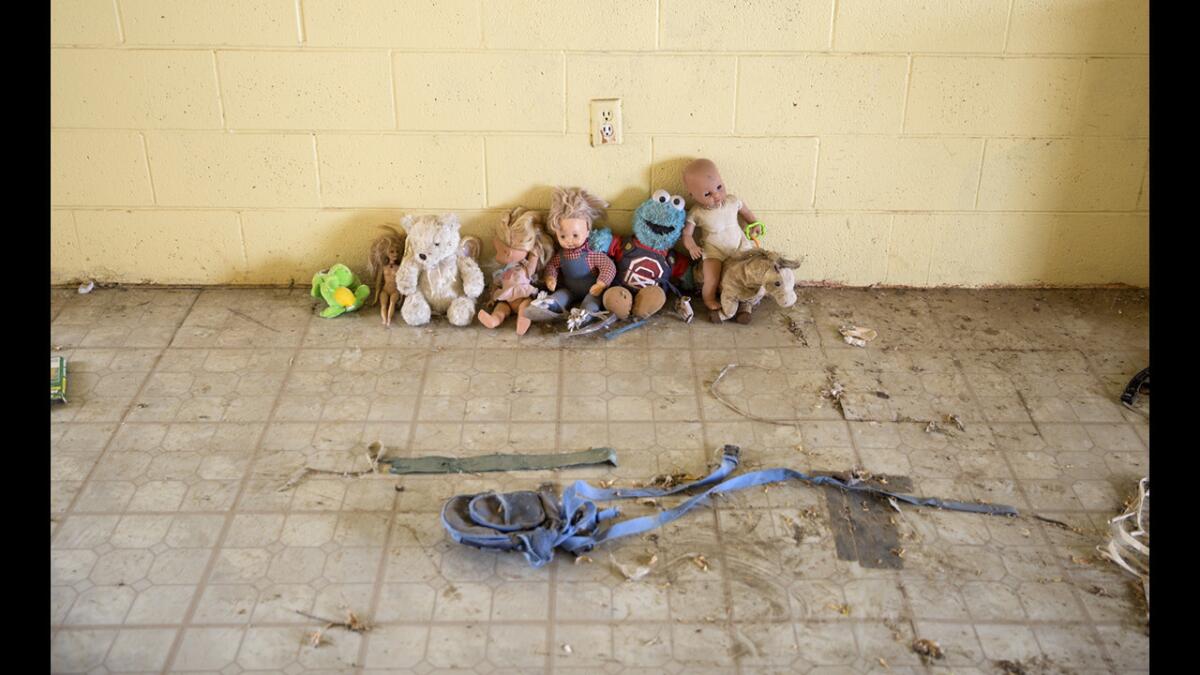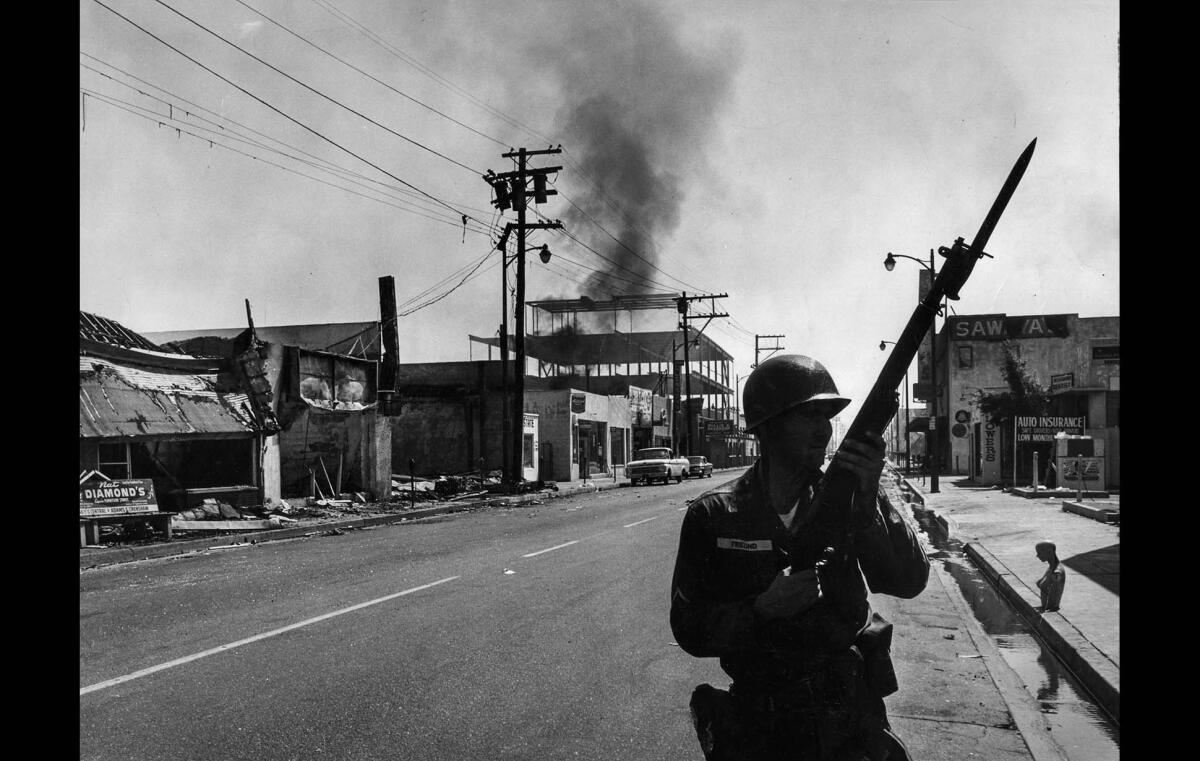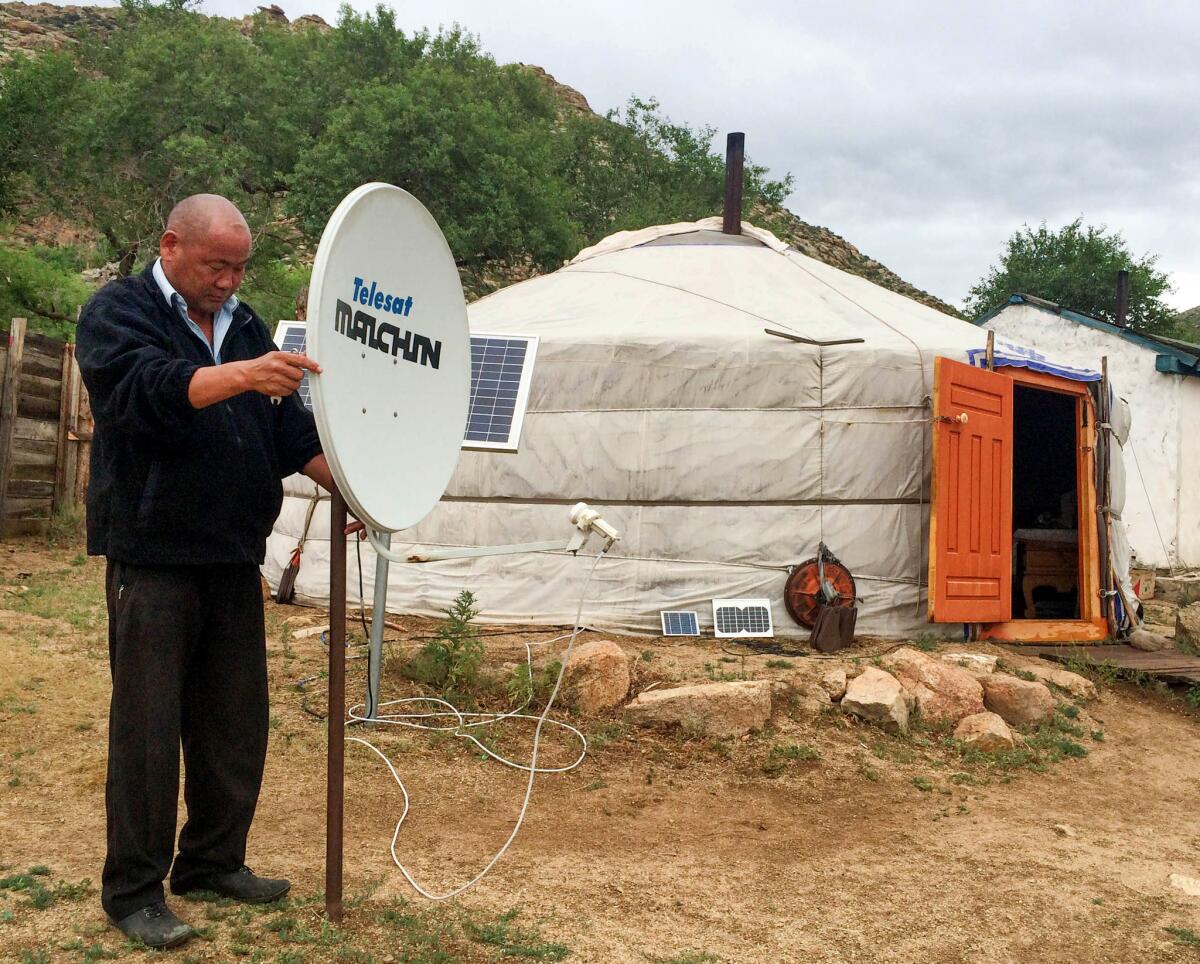Newsletter: Great Reads: Watts riots and Obama’s first Spotify playlist
Hi there. I'm Kari Howard, and I edit the Great Reads (a.k.a. Column Ones) for the Los Angeles Times.
Two of my biggest loves are narrative journalism and music, and I'm lucky that my days are filled with both: When reading the stories, I get inspired by songs I think fit the article's theme — a soundtrack.
Here are the Great Reads (and some lowercase great reads) of the last week, plus their soundtracks.
The littlest victims of the California drought
Cindy Carcamo's story about how the drought has affected the Head Start program for the children of migrant children begins with a haunting image: a line of abandoned dolls, most of them wearing farm-themed clothes. (What is it about some old dolls that's almost scary? In this island of misfit toys, it's the doll who has one eye permanently shut, like a terrible wink.) "They had kids. They had little kids. Lots of little kids," says Donna Toscano, one of the workers with the Head Start program. The workers have a lot at stake too -- if the program is shuttered because all the children have left, they too will be out of jobs. Toscano says she may move to Colorado. She has family there and, more important, "there's water over there," she says.
Abandoned children's toys are lined up along a wall inside an abandoned migrant housing complex near Five Points, California. “The kids have left. Look at all the families that had to leave this area because there is no water,” said Migrant Head Start staffer Diana Toscano. (Brian van der Brug / Los Angeles Times)
The soundtrack: "Hard Travelin'," by Woody Guthrie. Perhaps predictably, Guthrie has been a frequent soundtrack for stories on California's Dust Bowl. And this song fits the theme of migrant workers having to leave the Central Valley because, as the signs along the roads say, "no water = no jobs."
On Watts: 'How could this coverage have won a Pulitzer Prize?'
I'm pretty sure Doug Smith has been in The Times newsroom for longer than anyone else still here (and he has one of the biggest hearts of the newsroom too). For the last several years, he's headed the data team. Doug combined all of those things to take on a difficult story: assessing this paper's coverage of the Watts riots, 50 years later. As he says in this thought-provoking piece, "When I joined The Times in 1970, they were the giants of the newsroom, still sharing the glow of the Pulitzer Prize for their coverage of the Watts riots five years earlier. Forty-five years later, I looked back on how they told Los Angeles' most tumultuous story of that era, and my first reaction was, 'How could this coverage have won a Pulitzer Prize?' " He understands that sensibilities and terms have changed, but I agree with him that the use of "the Negro" as a collective noun is unsettling. One commenter wrote: "Mr Smith has written a great article here, one of the best I have ever read in the Times."
Aug. 14, 1965: A California National Guardsman patrols 103rd Street near Compton Avenue in the Watts business district. (Ray Graham / Los Angeles Times)
The soundtrack: "I Like the Things About Me," by the Staple Singers. This is from the Wattstax concert, held in 1972 at the Coliseum to commemorate the seventh anniversary of the riots. I wish I could have gone to it -- so many genius performers. I recommend listening to the whole three hours 47 minutes of it. (Pop Staples' rap in the middle of this song is great.)
57 channels and nothing's on
Even in Mongolia, the Bruce Springsteen song probably fits. But that doesn't stop a peasant named Tsagaana from grabbing the power cord from his mini solar panel, plugging in his satellite dish and channel surfing. He gets everything from "Breaking Bad" to Hollywood blockbusters. "But mostly, I like Mongolian programs," he says. "They're easier to understand." Although Mongolia has just 3 million people scattered over an expanse about four times the size of California, it has 138 homegrown television stations — 80% of them founded in the last 10 years. Most intriguing fact: The country has shot up the World Press Freedom Index compiled by Reporters Without Borders, rising from No. 100 in 2012 to No. 54 this year — just five spots behind the United States. Who are the 48 ahead of America??
Tsagaana Davaa adjusts the solar-powered satellite dish outside his yurt in a remote part of Mongolia. He gets more than 60 stations, offering everything from “Breaking Bad” to Hollywood blockbusters. (Julie Makinen / Los Angeles Times)
The soundtrack: "Everybody's Talkin'," by Harry Nilsson. I was tempted to go with the Springsteen song, but decided to go with Nilsson. Even though he didn't write this one, he made it his own. I love his range: from the silly-but-irresistible "Coconut" to the overwrought but occasionally very satisfying (post-breakup, say) "Without You."
'Remember life is a joyous thing, no matter what’s wrong'
You know when stories have that "oh wow" moment? The final story from the #DrylandsCA drought road trip (for now, at least) had several of them. And most involved a wonderful woman named Marci Ward. She suffers from a condition that is sucking the moisture from her cells. Her skin is thin and stretched. Her eyes have no tears. She's actually a human drought. Stunning. So that was one "oh wow" moment. The other is the quote I used in the headline above. Because that was the theme that ran through the trip: Even though the drought has changed the lives of almost everyone reporter Diana Marcum and photographer Robert Gauthier (and dog Murphy) met, not a single person was giving up. That spirit in the face of adversity was a lovely thing to see.

Marci Ward hugs dog Murphy. (Robert Gauthier / Los Angeles Times)
The soundtrack: "Bridge Over Troubled Water," by Johnny Cash. I'm not a huge fan of the Simon and Garfunkel original. Too overwrought (so I'm inconsistent on the overwrought front -- see Nilsson above). But this Cash version, which came on one of the brilliant cover albums he did with producer Rick Rubin, is stripped down. It's shot through with his life experience, a lifetime of troubles and monumental love.
What I'm reading
This story in the New York Times about the culture of rape in the Islamic State militant group is absolutely chilling. It recounts rape after rape of their piteous sex slaves, bookended by prayer. It ends with this: "Unmoved, he ignored the girl’s agony, continuing the ritual of praying before and after raping the child. 'I said to him, "She’s just a little girl,”' the older woman recalled. 'And he answered: "No. She’s not a little girl. She’s a slave. And she knows exactly how to have sex. And having sex with her pleases God."'"
And also from the New York Times (but much less grim) is this great little story that reporter Nicole Santa Cruz alerted me to about President Obama's first Spotify playlists. Never thought I'd be following a president on Spotify -- but that's what I promptly did after reading the post. My favorites on his daytime list: "Rock Steady," by Aretha Franklin (perfect for a Friday afternoon) and "Hot Fun in the Summertime," by Sly & the Family Stone. My favorites on his nighttime list: "How Can You Mend a Broken Heart," by Al Green, "The Best Is Yet to Come," by Frank Sinatra and "Feeling Good," by Nina Simone (I have my own Spotify playlist of that song -- just the one song six times over so I don't have to hit repeat.)
What's on my bedside table
I can reread old Ross Macdonald paperbacks over and over. He may not be as famous as Raymond Chandler, but he is an L.A. noir master. Right now I'm rereading "The Underground Man," and how about this for a chapter opener: "Jean was looking down at her husband's face as if she wondered how it felt to be dead." And this makes me wistful for those days of big papers and people spending all morning with them (plus, a great line about the classifieds): "I walked ... down the street and bought the weekend edition of the Los Angeles Times. I lugged it home and spent most of the morning reading it. All of it, including the classifieds, which sometimes tell you more about Los Angeles than the news."
What's on my turntable
Although I spend most of my time listening with headphones to Spotify, sometimes I want to hear the needle touching down on vinyl. That's why I have a turntable in my office — and two at home (one inside, and a battery-powered one outside when the weather's fine — which it usually is in Southern California). This week's vinyl: "The Race for Space," by Public Broadcasting Service. This band uses snippets of vintage soundbites as the lyrics for its songs, and it's never worked better than in this album. You get the full drama of the original space race, a kind of soundtrack for Tom Wolfe's "The Right Stuff." I particularly love the anxiety and the ecstasy of "The Dark Side" and "Go."
Want to chat? Have a great idea for a Great Read? I'm @karihow on Twitter and kari.howard@latimes.com on email.
The biggest entertainment stories
Get our big stories about Hollywood, film, television, music, arts, culture and more right in your inbox as soon as they publish.
You may occasionally receive promotional content from the Los Angeles Times.






